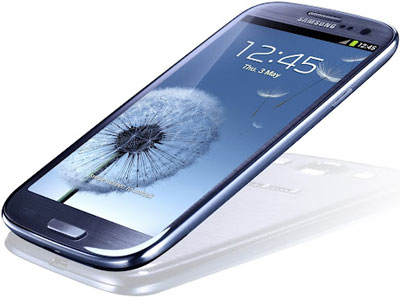Galaxy S III Serves Up Big Dollop of Ice Cream Sandwich
Unknown | 06:06 |
Samsung launched the Galaxy S III smartphone in London on Thursday. The device will run Android Ice Cream Sandwich (ICS), version 4.0 of the mobile OS. The Galaxy S III's features include facial and voice recognition, voice command capability and eye tracking.

The Samsung Galaxy S III
"We believe the Galaxy S III is the most anticipated product in the 20-year history of Samsung Mobile," Blythe Makenzie, Samsung Mobile's representative, told TechNewsWorld. "We will continue to share information as it becomes available."
The Galaxy S III's Specs
The Galaxy S III has an 4.8-inch Super AMOLED 1,280 by 720 pixel screen, an 8 MP autofocus rear camera with flash and zero shutter lag, a front-facing 1.9 MP camera that records HD videos at 30 fps with zero shutter lag, and WiFi and Bluetooth 4.0 capability.
It also offers NFC, or near-field communications, which enables mobile payments and lets devices exchange data when they touch.
The S III also has an accelerometer, an RBG light, a digital compass, a barometer, a gyroscope and a proximity sensor.
Other features are Smart Stay, S Beam, Buddy Photo Share, Share Shot, AllShare Play, AllShare Cast, social and group tags, S Voice, and links to the usual Google (Nasdaq: GOOG) mobile services.
Google, FCC Showdown Spotlights Technology Law Lag
Unknown | 21:18 |
 Google apparently wants to get all the Street View dirt out in the open at once in the hope of putting the incident to bed instead of being needled by slowly emerging details. That would explain why it released the FCC's full report of its investigation into its unsavory data-collection ways. Although there's a decided stink around the company's handling of privacy in this case, apparently it did nothing illegal, and that's what Google wants to unders
Google apparently wants to get all the Street View dirt out in the open at once in the hope of putting the incident to bed instead of being needled by slowly emerging details. That would explain why it released the FCC's full report of its investigation into its unsavory data-collection ways. Although there's a decided stink around the company's handling of privacy in this case, apparently it did nothing illegal, and that's what Google wants to unders
Google (Nasdaq: GOOG) is trying to do damage control and prove it had no nefarious goals with its ambitious Street View project, following an FCC into the search giant's collection and storage of data from millions of unknowing households across the country.
The Federal Communications Commission determined in its report that the data collection was not illegal; however, it slapped Google with a US$25,000 fine for obstructing its investigation -- a contention Google has denied. Instead, Google pointed a finger at the FCC for delaying its own investigation.
It could have ended there, but Google released the agency's full report of the investigation over the weekend, and in doing so revealed details that only served to raise new questions about its practices over a two-year period.
Google has continued to maintain that it was mapping wireless networks and that any data collected was "inadvertent."
"We decided to voluntarily make the entire document available except for the names of individuals," said Google spokeswoman Jill Hazelbaker. "While we disagree with some of the statements made in the document, we agree with the FCC's conclusion that we did not break the law. We hope that we can now put this matter behind us."
Flight+: Planespotting Made Easy
Unknown | 21:16 |
 Flight+ is a detailed and always up-to-date flight schedule that tracks thousands of airports and flights all over the world. It's a great companion for constant travelers who need to stay on top of departure and arrivals. The information it presents could be found elsewhere, but with Flight+, it's all packed into a clean and easy-to-navigate interface.
Flight+ is a detailed and always up-to-date flight schedule that tracks thousands of airports and flights all over the world. It's a great companion for constant travelers who need to stay on top of departure and arrivals. The information it presents could be found elsewhere, but with Flight+, it's all packed into a clean and easy-to-navigate interface.

Flight+
I've been experiencing a good luck streak lately when it comes to air travel. There's been no lost luggage, no security incidents, only short delays and some pretty easy itineraries. I realize that I've jinxed it all to hell by writing this, but it was great while it lasted.
Even when air travel goes smoothly, though, there are sometimes hectic moments during which information must be attained right nowif you want to avoid missing your flight and spending the night in a cigarette-smelly motel room.
All that information -- flight numbers, departure and arrival times, airport conditions, etc. -- is accessible through a smartphone. It's just not always very organized. Google (Nasdaq: GOOG) works well sometimes, other times not. If you have a favorite airline you can perhaps get flight alerts, but what if you use lots of different airlines?
Flight+ is an app that corrals all kinds of publicly available flight information and presents it through an organized and easy-to-navigate interface. It's an always up-to-date universal schedule incorporating airlines, flights and airports all over the world. And it can be personalized with your own itinerary.
There are actually two versions of Flight+ -- one for iPhone and one for iPad. This isn't one of those deals that will give you one version for free if you buy the other. The iPad version is naturally able to show more info at once, but since someone hustling between flights would probably rather whip out a phone than unpack an iPad (then maybe hunt around for WiFi), I looked at the iPhone version.
Got Your Number: Skype Investigates IP Discovery Flaw
Unknown | 21:14 |
 A flaw in Skype apparently allows users to learn the Internet protocol addresses of other users. Finding out that someone's snooped your IP address may not sound as alarming as finding out your Social Security number's been exposed, but the information could be used by a determined and talented hacker to build up more sophisticated attacks.
A flaw in Skype apparently allows users to learn the Internet protocol addresses of other users. Finding out that someone's snooped your IP address may not sound as alarming as finding out your Social Security number's been exposed, but the information could be used by a determined and talented hacker to build up more sophisticated attacks.
Skype is investigating a tool published recently on Pastebin that captures the last-known IP address of the VoIP service's users.
"This is an ongoing, industry-wide issue faced by all peer-to-peer software companies," Adrian Asher, Skype's director of product security, told TechNewsWorld. "We are committed to the safety and security of our customers and we are taking measures to help protect them."
This particular flaw was discussed in a paper presented by an international team of researchers in November at the Internet Measurement Conference 2011 in Berlin.
The flaw could lead to serious attacks, warned Randy Abrams, a security consultant.
"There's a lot more at risk than simply IP disclosure," Abrams told TechNewsWorld. "The ability to redirect to another Web page implies the ability to frame someone for accessing child pornography, among other non-trivial attacks, for example."
It's Tool Time!
The tool exploits a patched version of Skype 5.5. Skype's flaw lets anyone see another person's vCard and get that person's real user IP address and the IP address of the internal network card on that person's PC.A vCard is a file format standard for electronic business cards.
More information about the target, such as the city and country where he or she is located, and the Internet service provider the target is using, can be obtained by going to a Whois service.
Whois is used to get information on registered users or assignees of domain names and IP address blocks, among other things.
Findings of the Research Team
The researchers stated that the flaw could let Voice over IP (VoIP) phone systems, including Skype, be exploited by third parties to ascertain users' identities, locations and digital files. The flaw can be exploited by a sophisticated hacker of high school age, they said.Tracking Skype accounts and combining this with commercial geo-location services let the researchers construct a detailed account of a user's daily activities even if the user had not accessed Skype for 72 hours.
By repeatedly calling targets over Skype and terminating the calls regularly, perhaps hourly, attackers could find out the locations and movements of any Skype user over weeks or months without the targets' knowledge, the researchers said. They could discover which digital files targets downloaded by combining this attack with tracking targets' activities on popular peer-to-peer file sharing systems such as BitTorrent.
Linking data obtained from VoIP systems through the flaw to personal information from social media sites would let marketers create profiles on large numbers of people, the researchers said. They estimate it will cost a marketer only about US$500 a week to track 10,000 users.
The researchers notified both Skype and Microsoft (Nasdaq: MSFT), which purchased Skype last year, of their findings.
Hitting Gamers and Mobile Devices
Skype service is now available on the Windows Phone and the PlayStation Vita, and this may open up new areas of attack."The potential of abuse on these platforms needs to be carefully reviewed," Abrams warned. "The problem itself may well exist in other undiscovered areas, as programming logic errors are commonly repeated."
The Art of VoIP Self-Defense
The researchers suggested various tactics VoIP service providers can use to protect users.One approach is for the designer of the VoIP signaling protocol to ensure that a user's IP address is not revealed to callers unless the user accepts the call. If a user blocks all calls from people not on their contact list then anyone not on that list won't be able to determine the user's IP address. The researchers recommend this solution for all VoIP applications. Think of this as Caller ID in reverse.
Users may also want to block people on their contact list from getting their IP address. To do this, the researchers suggested VoIP service providers pass all calls through relays. This will attach the IP address of the relay to the data. However, this solution increases VoIP traffic and slows P2P communication.
 Facebook may genuinely want to help facilitate organ donation through its new status update feature. However, the gesture is also likely to add more polish to the company's image, which is always a good thing just prior to an IPO. The initiative "presents a friendly face to investors -- retail investors, especially," said David Johnson of Strategic Vision. "It can only help drive up the price of Facebook's stock."
Facebook may genuinely want to help facilitate organ donation through its new status update feature. However, the gesture is also likely to add more polish to the company's image, which is always a good thing just prior to an IPO. The initiative "presents a friendly face to investors -- retail investors, especially," said David Johnson of Strategic Vision. "It can only help drive up the price of Facebook's stock."
In most respects, the numbers reflecting the state of organ donation in the U.S. paint a grim picture. There are 114,183 people waiting for an organ -- 18 of whom will die each day, according to the U.S. Department of Health and Human Services webpage OrganDonar.gov. Facebook has now added another number to the mix: 900 million -- its user base.
In a new initiative, Facebook is encouraging its users to share their organ donor status. Updates about this status will appear on users' Timelines and in their profiles. The point of this push, Facebook CEO Mark Zuckerberg and COO Sheryl Sandberg wrote in a blog post, is that it will raise awareness of the issue.
To add an update, users go to their Timeline, then click on "Life Event." Then they click on "Health & Wellness" and then "Organ Donor."
There are prompts to add where and when users are registered, as well as a field to enter a personal story. There are also links to appropriate registries for users who haven't signed up yet.
Social Media Driver
There is every reason to agree to think this initiative will meet, at a minimum, its stated goal of raising awareness, David Johnson, principal with Strategic Vision, told TechNewsWorld."People respond now to Facebook more than they do to traditional means of advertising. In most marketing campaigns -- including, increasingly, campaigns by not-for-profits -- a Facebook element is considered essential," he said.
The reason for this has been dissected, discussed and analyzed intensely over the years. Despite Google's (Nasdaq: GOOG) attempts to dislodge Facebook from its perch as the premier social network, it is without a doubt the top site.
"Facebook is where people go to read news, to find out what is happening with friends and family, to do product research," Johnson said.
Getting Ready for an IPO
Of course, the question arises, what's in it for Facebook? It is hard to imagine Facebook's founders being so callous as to not appreciate the good such an initiative can do."Almost everyone has either known someone in their family or in their circle of friends who has needed an organ transplant," Johnson said.
It is equally difficult to imagine that the founders are unaware of what such an initiative could mean for Facebook as a public company, he added. Facebook is reportedly going to launch its IPOthis month.
The organ donation initiative, Johnson said, "presents a friendly face to investors -- retail investors, especially. It can only help drive up the price of Facebook's stock."
Ubuntu Netbook Remix
Unknown | 05:46 |

Ubuntu Netbook Remix is optimised to run on a new category of affordable Internet-centric devices called netbooks. It includes a new consumer-friendly interface that allows users to quickly and easily get on-line and use their favourite applications. This interface is optimised for a retail sales environment.
Samsung Canada Announces Android 4.0 ICS Update For Multiple Devices
Unknown | 05:41 |
Samsung Canada has announced that it will start rolling out the Android 4.0 Ice Cream Sandwich update to multiple devices in Canada, and the list includes devices like the Samsung Galaxy Note, Galaxy Tab 10.1 and the Samsung Galaxy S II.
Samsung has said that the update will be rolled out to various devices throughout the quarter, you can see a full list of the devices that will be getting the update below.

“We are passionate about providing the best possible mobile experience to Canadians and the upgrade to Android 4.0 will offer an improved user experience for Samsung GALAXY devices,” said Paul Brannen, Vice President, Mobile Communications at Samsung Canada. “We expect that our customers will enjoy an enhanced experience with their GALAXY device through this upgrade and we remain committed, alongside our carrier partners, to satisfy our customer needs”.
Devices eligible for an ICS upgrade include:
GALAXY S II
GALAXY S II LTE
GALAXY S II LTE HD
GALAXY S II X
GALAXY Note
GALAXY Tab 7.0
GALAXY Tab 7.0 Plus
GALAXY Tab 8.9
GALAXY Tab 10.1
GALAXY S II LTE
GALAXY S II LTE HD
GALAXY S II X
GALAXY Note
GALAXY Tab 7.0
GALAXY Tab 7.0 Plus
GALAXY Tab 8.9
GALAXY Tab 10.1

